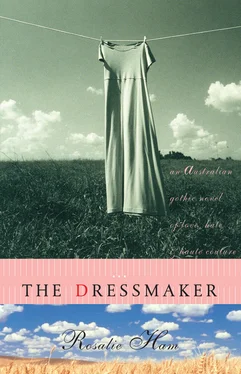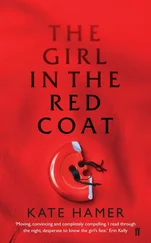Rosalie Ham - The Dressmaker
Здесь есть возможность читать онлайн «Rosalie Ham - The Dressmaker» весь текст электронной книги совершенно бесплатно (целиком полную версию без сокращений). В некоторых случаях можно слушать аудио, скачать через торрент в формате fb2 и присутствует краткое содержание. Год выпуска: 2000, ISBN: 2000, Издательство: Duffy & Snellgrove, Жанр: Историческая проза, Современная проза, на английском языке. Описание произведения, (предисловие) а так же отзывы посетителей доступны на портале библиотеки ЛибКат.
- Название:The Dressmaker
- Автор:
- Издательство:Duffy & Snellgrove
- Жанр:
- Год:2000
- ISBN:9781875989706
- Рейтинг книги:5 / 5. Голосов: 1
-
Избранное:Добавить в избранное
- Отзывы:
-
Ваша оценка:
- 100
- 1
- 2
- 3
- 4
- 5
The Dressmaker: краткое содержание, описание и аннотация
Предлагаем к чтению аннотацию, описание, краткое содержание или предисловие (зависит от того, что написал сам автор книги «The Dressmaker»). Если вы не нашли необходимую информацию о книге — напишите в комментариях, мы постараемся отыскать её.
The Dressmaker — читать онлайн бесплатно полную книгу (весь текст) целиком
Ниже представлен текст книги, разбитый по страницам. Система сохранения места последней прочитанной страницы, позволяет с удобством читать онлайн бесплатно книгу «The Dressmaker», без необходимости каждый раз заново искать на чём Вы остановились. Поставьте закладку, и сможете в любой момент перейти на страницу, на которой закончили чтение.
Интервал:
Закладка:
‘Mum?’
A body stirred under piled blankets. A skeleton head wearing a tea cosy turned on a grubby kapok pillow. The mouth gaped like a charcoal hole, and sunken eyes gazed at her.
Molly Dunnage, mad woman and crone, said to her daughter, ‘You’ve come about the dog have you? You can’t have him. We want to keep him.’
She gestured at a crowd of invisible people around her bed, ‘Don’t we?’ She nodded at them.
‘This is what they’ve done to you,’ said Tilly.
A mitten, stiff and soiled, came from under the blankets. Molly looked at her skinny wrist. ‘Half past four,’ she said.
Tilly unpacked the bottle of brandy she’d bought for her mother and sat on the back veranda looking down at the dull forms of Dungatar at slumber. She wondered about what she had left behind her, and what she had returned to.
At dawn she sighed and raised a glass to the small grey town and went inside. She evicted snug families of mice from between the towels in the linen press and spiders from their lace homes under light shades. She swept dust, dirt, twigs and a dead sparrow from the bath and turned on the taps to scrub it. The water ran cold and brown and when it flowed clear and hot, she filled the bath, then added lavender flowers from the garden. She tugged her mother from her crusty bed and pulled her tottering towards the bath. Mad Molly cursed, scratched and punched Tilly with Daddy Long Legs limbs, but soon tired and folded easily into the water.
‘Anyway,’ she snapped, ‘everyone knows red jelly stays harder longer,’ and she cackled at Tilly with green gums and lunatic eyes.
‘Give me your teeth,’ said Tilly. Molly clamped her mouth shut. Tilly pressed Molly’s forearms across her chest, pinning her, then pinched her nostrils until Molly opened her mouth to breathe. She prised the teeth out with a spoon and dropped them into a bucket of ammonia. Molly yelled and thrashed about until she was exhausted and clean and, while she soaked, Tilly stripped the beds. When the sun was high she dragged the mattresses out onto the grass to bake.
Later she tucked Molly’s scrawny frame back into bed and spooned her sweet black tea, talking to her all the while. Molly’s answers were maniacal, angry, but answers just the same. Then she slept, so Tilly cleaned out the stove, gathered kindling from the garden and lit a fire. Smoke ballooned up the chimney and a possum in the roof thumped across the beams. She threw open all the doors and windows and started flinging things out – an ancient sewing machine and a moth-eaten dress stand, a wringer washing machine shell, old newspapers and boxes, dirty curtains and stiff carpet pieces, a couch and its ruined chairs, broken tables, empty tin cans and glass bottles. Soon the little weatherboard house stood stump deep in rubbish.
When Molly woke, Tilly walked her all the way down to the outhouse where she sat her on the toilet with her bloomers around her ankles and her nightie tucked up into her jumper. She tied her hands to the toilet door with her dressing gown cord so that she would not wander off. Molly bellowed at the top of her old lungs until she was hoarse. Later, Tilly heated tinned tomato soup and sat her mother in the sun – emptied, cleaned and wrapped in jumpers, gloves, cap, socks, slippers and blankets – and fed her. All the while Mad Molly prattled. Tilly wiped her mother’s sauce-red mouth. ‘Did you enjoy that?’
Her mother replied formally, ‘Yes thank you, we always do,’ and smiled graciously to the others attending the banquet, before vomiting over the strange woman she thought was feeding her poison.
Again Tilly stood on the veranda, the breeze pressing her trousers against her slim legs. Below her, smoke circled from beneath a copper in the McSwineys’ yard at the base of The Hill beside the tip. Strangers assumed the bent railway carriages and dented caravans were part of it, but it was where the McSwiney family lived. Edward McSwiney was Dungatar’s night cart man. He could negotiate every outhouse, every full dunny can in Dungatar – even on the blackest, windiest nights – without spilling a drop. During the day he also delivered things, riding around on his cart with his middle son Barney and a bunch of kids hanging off the back.
Little Myrtle used to watch the McSwiney kids playing: the oldest boy, a few years younger than herself, then three girls and Barney, who was ‘not quite finished’. He was crooked, with an upside-down head and a club foot.
The town itself rested in the full glare of the morning sun. The railway station and the square, grey silo sat along the railway line, whose arc held the buildings against the bend of the Dungatar creek, like freckles on a nose. The creek had always been low, choked with willows and cumbungi weed, the flow sluggish and the water singing with mosquitos. The pioneer founders of Dungatar had allowed a flood plain along its inner curve, which was now a park of sorts with a community hall in the middle, Mr and Mrs Almanac’s low damp cottage at the eastern end opposite their chemist shop, and the school at the western edge, where Prudence Dimm had taught the children of Dungatar for as long as anyone could remember. The main road followed the curve of the park, separating it from the commercial strip. The police station was situated out along the road to the east, halfway between the cemetery and the town’s edge. It was not a busy road and there were few shops at its kerb, the chemist shop, then the Station Hotel, and then A and M Pratt, Merchant Supplies – a general store which sold everything anyone needed. The post office, bank and telephone exchange were housed together in the next building, and the last, most western building was the shire office and library combined. The houses of Dungatar, dotted behind the commercial strip, were dissected by a thin gravel road that ran to the football oval.
The green eye of the oval looked back up at Tilly, the cars around its edge like lashes. Inside, her mother stirred and called, and the possum thumped across the ceiling again.
Tilly went to the dress stand lying on the grass. She stood it up and then hosed it down, leaving it to dry in the sun.
2
On Saturday mornings the main street of Dungatar sang to the chug of farm trucks and solid British automobiles bearing smart pastoralist families. Younger children were passed into the care of older siblings, and sent to the park so mothers could shop and gossip. Men stood in clumps talking about the weather and looking to the sky, and thin-skinned, thick-boned women in floral sunfrocks and felt hats sat behind trestle tables selling raffle tickets.
Sergeant Farrat made his way past a young man slouched behind the wheel of a dusty Triumph Gloria and across the road towards Pratts. He encountered Mona Beaumont on the footpath outside.
‘Good morning, Mona,’ he called, ‘I see you have your brother safely at home.’
‘Mother sa-ays we can let the dreadful hired help go. That Mr Mac-Swiney …’ Mona had a way of making words flat and long so Sergeant Farrat always used his most melodious vowels when he spoke to her. ‘Not too hasty Mona, there’s a fair chance William will be snapped up by one of our eligible spinsters before long.’ He smiled mischievously, ‘You might find he’s busy elsewhere.’
Mona shrank a little sideways and picked at the pilling on her cardigan cuff. ‘Mother sa-ays the girls around here are un-refined.’
Sergeant Farrat looked at Mona’s tweed beret sitting on top of her head like a dead cat, her posture laden and graceless. ‘On the contrary Mona, history has made us all independent, these are progressive times – it’s an advantage to be adept, especially in the fairer sex …’
Mona giggled at the sex word.
Читать дальшеИнтервал:
Закладка:
Похожие книги на «The Dressmaker»
Представляем Вашему вниманию похожие книги на «The Dressmaker» списком для выбора. Мы отобрали схожую по названию и смыслу литературу в надежде предоставить читателям больше вариантов отыскать новые, интересные, ещё непрочитанные произведения.
Обсуждение, отзывы о книге «The Dressmaker» и просто собственные мнения читателей. Оставьте ваши комментарии, напишите, что Вы думаете о произведении, его смысле или главных героях. Укажите что конкретно понравилось, а что нет, и почему Вы так считаете.











